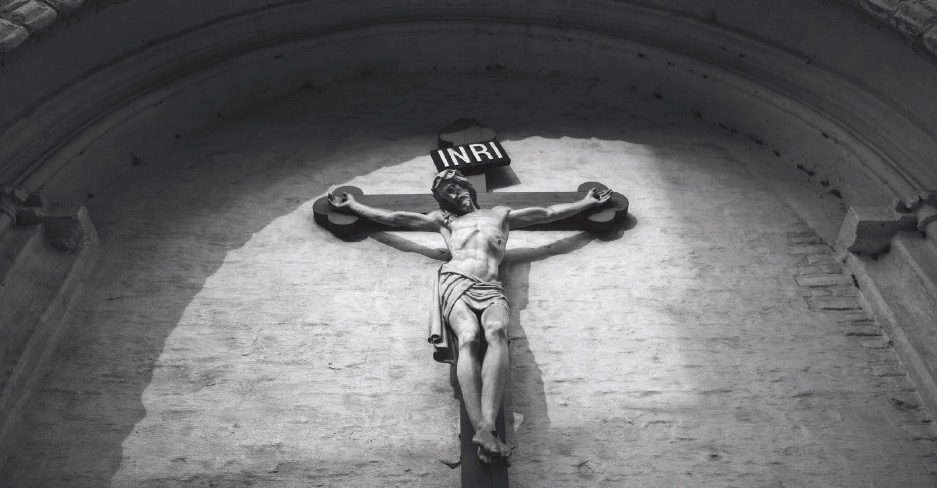“But to you who hear I say, love your enemies, do good to those who hate you, bless those who curse you, pray for those who mistreat you. To the person who strikes you on one cheek, offer the other one as well, and from the person who takes your cloak, do not withhold even your tunic. Give to everyone who asks of you, and from the one who takes what is yours do not demand it back. Do to others as you would have them do to you. For if you love those who love you, what credit is that to you? Even sinners love those who love them. And if you do good to those who do good to you, what credit is that to you? Even sinners do the same. If you lend money to those from whom you expect repayment, what credit [is] that to you? Even sinners lend to sinners, and get back the same amount. But rather, love your enemies and do good to them, and lend expecting nothing back; then your reward will be great and you will be children of the Most High, for he himself is kind to the ungrateful and wicked. Be merciful, just as [also] your Father is merciful.
“Stop judging and you will not be judged. Stop condemning and you will not be condemned. Forgive and you will be forgiven. Give and gifts will be given to you; a good measure, packed together, shaken down, and overflowing, will be poured into your lap. For the measure with which you measure will in return be measured out to you” (Lk 6:27-38).
If you’ve ever been wronged—deeply hurt—there’s a good chance this passage feels about as soothing as sandpaper to your wound. The enemies of our day may seem a bit different from the ones of Jesus’ day, but the ache of the human heart is the same, and the memories, new and old, still painfully raw.
For me, it was a comment that cut to the core.
I was a young military professional, working hard to serve my country while striving to live my faith without compromise. I’d weathered plenty of criticism in my first few years on the job, as tends to happen when our fidelity to God conflicts with the world’s demands, but it all converged one evening in particular. My boss had been promoted, and we gathered as he made a formal farewell speech to a packed room of colleagues, guests and high-ranking honorees. I was listening intently to his well-rehearsed address when time seemed to slow; he was referencing my family and me—making our fidelity to God’s will the butt of a clearly pre-meditated joke. Cheap laughs filled the room at my expense; eyes settled on me as I squirmed silent and defenseless in my chair, the heat of embarrassment flushing scarlet across my face. The internal shame spread just as quickly, the injustice of his words plunging into my heart like a hot poker—branding it with a hiss that left a bitter, lasting scar.
I’ve had years to work through forgiveness, but that comment still smarts.
Maybe you have one of those too. Maybe your hurt is even more personal and painful; maybe the memory simply sucks the wind out of you the second it surfaces.
You’re not alone. But how are we to understand, let alone put into practice, Christ’s words of radical forgiveness when they feel like salt on the wound?
One of the most freeing truths in praying with this Scripture is that God doesn’t intend it for our harm. We know this because of who our God is: all loving, all-knowing and all good.
He’s not commanding us to be doormats. He doesn’t want us to be walked all over, be abused or have no boundaries.
But he does know that we have—and will—endure suffering. Persecution and suffering are an integral part of the cross. When God created us, he gave us freedom. He knew that in order to truly love him, we must first have the freedom to choose him. By default, this means we also have the freedom to choose against him—the freedom to choose evil, the source of all suffering. God certainly doesn’t distribute suffering according to merit or lack thereof; his role in it is never that of inflictor, but that of rescuer and redeemer through all of the damage evil can cause.
Fallen as we are, we choose evil more often than we’d like to admit. So do those around us. And whether intentional or not, someone is often caught in the crossfire.
Sometimes that someone is us.
When this inevitably happens, Christ tells us in this passage—and shows us time and again through his Passion—that as victims, we still have a choice in how we respond. But doesn’t it still sound like he’s telling us to respond by being boundaryless doormats? And if not, then what’s the underlying lesson here?

He’s asking us to see the need beyond the hurt.
He’s inviting us to something more redeeming than retaliation.
He’s telling us that there’s a better way out of this pain than choosing to inflict the hurt inflicted upon us.
He’s showing us that regardless of how someone tries to undermine our apparent dignity, Our Lord fully recognizes our inherent dignity, and provides us the option of a dignified response.
He’s giving us his prescription for a conversion of heart amidst the hurt.
Just as Christ affirms us in our humanness, he’s asking us to recognize theirs. We need to acknowledge others’ relational brokenness, their spiritual poverty; not reduce them to the sum of wayward actions which stem from their human destitution. Through this recognition, he plants the seeds of grace that enable us to gradually transform the pain of injury into intercession—prayer for our enemies. Our Lord seeks to help us desire good for their souls, to wish them freedom from evil instead of wishing them ill.
Simple as this sounds, it’s certainly not so easy in practice. For years I struggled with the pain of my memory, telling God I wanted to be able to forgive, reminding myself it was a choice, not necessarily a feeling. But in the process, I’d still find myself replaying the shame, the anger—circling around all the words I could’ve crafted for the perfect comeback to make this individual eat his words, realize his error, acknowledge the extent of injustice.
Thankfully, this passage from Luke gives us a radical example to contemplate instead when our human capacity to forgive is weak. We can almost hear the question Christ begs us to ask:
What is the poverty behind their offense?
“To the person who strikes you on one cheek…”
What poverty of love must exist for someone to lash out physically—deliberately? What internal pain have they endured to willingly inflict pain? In their wild hunger for physical contact, how starved might they be for genuine connection and acceptance?
“From the person who takes your cloak…”
What poverty of body and soul must exist for the one who seeks to better clothe him or herself with another’s possessions?
What dark, frigid nights—body and soul—have they trembled through? How many others have systematically and mercilessly stripped them of dignity, physically or spiritually, for them to voluntarily do the same?
And as we ponder these questions, allowing him to flesh out the personhood of our enemies in the shadow of our wounded hearts, he guides us through those dignified responses one by one:
“To the person who strikes you on one cheek, offer the other one as well.”
Jesus invites us to reach beyond our tendency to villainize the other. He asks us not to excuse the wrong, but to understand that we are not the sole victim, especially when it comes to the spiritual realm. He implores us to acknowledge the extent of our pain, the fullness of our injury, which reflects the scope of their pain, their need and their human brokenness. Only then can we begin to transform our tremendous hurt into intercession for the good of their souls.
“From the person who takes your cloak, do not withhold even your tunic.”
Jesus invites us to look beyond another’s nakedness and affirm their worth. Instead of further stripping them of their dignity, Jesus entreats us to clothe them with the acknowledgement that however errant their ways, they, too, are a child of God. With God’s grace, as we begin to comprehend the tragedy of lost dignity, we might even begin to transform our intercession for their souls into genuine compassion.
As for me: though I never saw my boss again, save for those difficult memories, contemplating these truths helped me to see him in my heart anew. Beyond his charismatic persona was the pressure of pursuing worldly acclaim and status; a desire for approval and fear of the future. In my own life, I see the continuing fruit of choosing God’s will despite the criticism all those years ago, and I can now sincerely pray for the good of this man and his family. I pray that he has, or will, know the deeply purifying, personal love of Our Father, and that—after receiving his forgiveness and making reparation for all the ways we’ve hurt others—we will both meet again in God’s kingdom.
This season of Lent is a beautiful time to unpack some of your own pains in light of these truths. As we walk alongside Christ toward his Passion and Resurrection, we see the moments when he responds in wisdom and justifiable anger to his accusers, but also those when he remains silent. It’s indeed at the height of his Passion and brutal persecution that Christ models these specific words from Luke most clearly; turning his cheek to those who beat him, literally giving his tunic as well to those who took his cloak. Yet, the nakedness that his enemies intended for humiliation, the painful torture they had designed to culminate in the finality of death—Christ, through his obedience, instead redeemed for the ultimate eternal victory of life over death, and elevated our human dignity to the highest place possible: that of the Divine.
We will certainly have our share of little passions and persecutions in this life. But we can never underestimate what our Christ-like response and intercession can accomplish for the most destitute of souls. Just as in the Cross of Christ, when we work to respond in charity and obedience, we can be confident that what man intends for harm, God will use for our redemption and victory.
Photos above by Unsplash.




